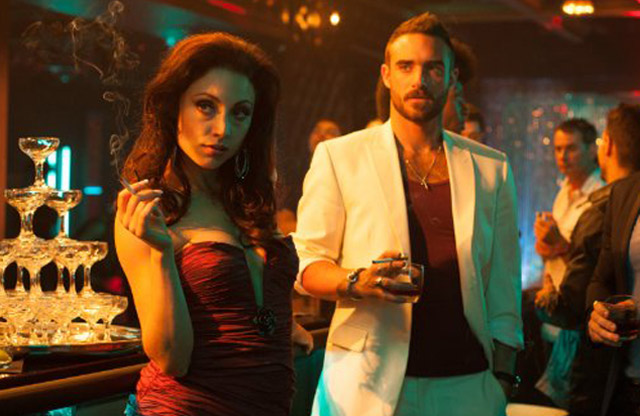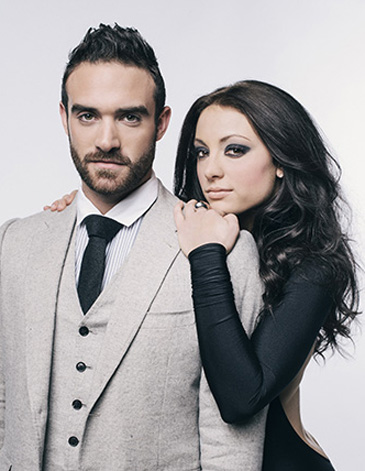CHICAGO – In anticipation of the scariest week of the year, HollywoodChicago.com launches its 2024 Movie Gifts series, which will suggest DVDs and collections for holiday giving.
Interview: Joshua Sasse, Leah Gibson of New TV Show ‘Rogue’
CHICAGO – One of the characteristics of the expanded TV spectrum is new programming from unlikely sources. DIRECTV is debuting a new series for their subscribers, a street drama called “Rogue.” The series features Thandie Newton as a conflicted undercover cop, and co-stars Joshua Sasse and Leah Gibson.
Sasse and Gibson were in Chicago recently to promote the show, and they didn’t want it characterized as a “police drama.” The police element is just part of this gritty and cinematic looking series, which the actors define as more of a family drama. Sasse and Gibson are part of the crime family that Newton’s character infiltrates, and on her personal side she deals with a crumbling home life. The action and the emotion are in the red zone, with all threatening to go “rogue.”
 Photo credit: DIRECTV |
Joshua Sasse and Leah Gibson come from different countries under the same crown. Sasse was born in London, grew up as a child in Nepal, and had his training in acting at Hurtwood House College and the Cygnet Training Theater. He mixed theater and feature films before landing the role in “Rogue.” He also runs a foundation aiding orphans in Nepal. Leah Gibson was born in Victoria, British Columbia, and began performing as a dancer. She interrupted her studies at the University of Victoria to take roles in ‘Watchmen,” “Twilight Saga: Eclipse” and “Rise of the Planet of the Apes,” before taking on the part of Cathy Laszlo in “Rogue.”
Sasse and Gibson sat down with HollywoodChicago.com to talk about their new series and the characters in the family.
HollywoodChicago.com: What do you feel are the ‘rogue’ elements in the series, in the way it is shot and presented, and how you approach your characters? What makes it that way versus other police dramas?
Joshua Sasse: First of all, I wouldn’t necessarily call it a ‘police drama.’ It’s a show about family in a very heightened situation, dealing with the consequences of that. You are seeing them take these problems home with them. In regards to the rogue part, with Thandie Newton’s character Grace you’re seeing her go undercover, but not in association with the police force, but on her own. That sort of vein runs through the show, the characters doing things against the grain.
Leah Gibson: In a way, the Laszlo family is like a rogue family. They have rogue doings and rogue happenings all around. One of the things that I appreciate so much about the show is [series creator] Matthew Parkhill’s writing. Everything is very current, believable and human – and I think the audience will respond to that – even in these unique scenarios.
HollywoodChicago.com: There is a thin line in the series regarding what defines law and order within the element in the crime family and how law enforcement goes after them. Why is the law versus what is criminal so hard to define in our society today?
Sasse: The line between right and wrong, good and evil, are questioned throughout the show. In society, this is the same case, when you look at governments and what they’re doing regarding the manipulation of the legal system and who is establishing that law. It’s the same with the Laszlos, the crime family in the show. Yes, they’re doing illegalities, but is it bad? Is it good? Is it right or wrong? It’s very dependent on the type of character that you are as a viewer, and your opinion about it. That is being questioned throughout the show, in the sense that you root for a character to do well.
It’s like watching a nature show and you see lion cubs, they look so sweet. Then you see them chasing a gazelle, and suddenly you don’t want the gazelle to die. Well, if that gazelle doesn’t die, then the lions don’t get fed. One minute you’re rooting for the lion cubs, the next the gazelle. That’s how it is with the show, if you root for one against the other, it can suddenly shift, depending on who you are. We’re mirroring society in a way like that.
Gibson: Yes, there is a thin line, but the line is blurred. This is no easy black and white world. There are different shades of gray with the families depicted in the show, and it becomes an interesting look with those shades. I portray Cathy Laszlo, a nasty and cunning woman, but she is also a devoted wife and mother. The involvement she has in the crime family has to do with the passion and devotion she has in protecting her family. I feel that each of the character’s motivations in the show are at a very truthful and honest place. The show is a very interesting character study.
HollywoodChicago.com: When you play characters like this, which run counter to your real life, how do you both find the keys to these crime family types, to open the door to their motivations?
Sasse: In anyone’s life, regardless whether you’re an actor or not, you go through some variation of every emotion. Everyone has been angry, or felt injustice, they’ve felt rage, love, concern, loss, grief, all of these things. So when I come up to a script and see these things, I just have to do my best to draw on those past experiences and adapt them to the role. The script is your guide, and you work it out. For the audience to believe that your emotions are honest and real, I have to find them from an honest and real place.
Gibson: For me personally, the greatest quality to exercise as an actor is compassion, and it’s how to reach an objective understanding of the character. I’m nothing like Cathy in real life, so how do I understand her and give her voice some truth, and just as important, why am I compelled to give this truth? I do have compassion for her, because despite how mean she can be, her heart is in the right place. Her actions are justified for her, and I find that interesting.
 Photo credit: DIRECTV |
HollywoodChicago.com: The series has a different look and feel than other dramas in this mode. What was the philosophy behind that look, with creator Matthew Parkhill, and how does that look play into the overall mood of the drama?
Sasse: He wanted to give the show a heightened sense of reality, and that was very important. DIRECTV wanted to produce something with high production values, so it was very cinematic. He really wanted to produce a new take on some universal themes, done to the visuals and the production design. That becomes a character in and of itself.
Gibson: To me it’s about Matthew’s brilliant writing, and Kieran McGuigan, our Director of Photography. He takes what we’re doing and creates more story within a scene just by his perspective, which is so powerful visually. The tone of the show holds it own by its distinction.
HollywoodChicago.com: What makes the show different, in your opinions, that the show has a female protagonist, versus a male protagonist who would possibly be in the same situation?
Sasse: It brings the family aspect of the story closer to home, that maternal instinct she has in pursuing her son’s killer, it becomes touching. Actually all the female characters in the show are strong, and it does characterize the old saying ‘behind every great man, is a great woman rolling her eyes.’ [laughs] That behind-the-scenes pulling of the strings becomes very important in the modern day presence of the drama in the show.
Gibson: She is the hero in the storyline, if you want to look at it in a classical sense. She is taking on a typical male role, as an undercover cop chasing a crime lord, but how she will be able to do it, and where she goes from there is more intriguing because she is a woman. The stakes are higher.
HollywoodChicago.com: Since you are both evolving in the beginning of your careers, what did you learn on this set about the craft of on-camera acting as opposed to other sets you’ve been on?
 Photo credit: DIRECTV |
Sasse: When you’re doing a series with a ‘long character arc,’ as we call it, you have spend some time understanding who that person is, and not make too many decisions too soon. If you do theater, for example, you know the beginning and the end, the exact journey the character will take. In series television, you don’t know what’s going on week-to-week, script-to-script. So you have to formulate a good idea of who this person is, and be very receptive to change. You have to become that person much more than in theater, and live with him every day. It actually became difficult to shake him off.
Gibson: The show is more of a thriller than an emotionally dark piece, but to play a character within it I was going to some dark places. There was joy to that, in an obscure way, and I loved playing the character. I feel like she is close to me, and I want the best for her. I grew with her.
HollywoodChicago.com: Leah, how has your discipline as a dancer helped you as an actor?
Gibson: I started dancing when I was four, and what it gave me was I cannot work on material enough, I overwork and over prepare. Because of the discipline of dancing, preparation is always the key.
HollywoodChicago.com: Finally, Joshua, you lived for a short time in Nepal as a child, and you have come back to the country with your work in The Umbrella Foundation. What has been your journey from living there as a child to your involvement now?
Sasse: My father was a poet, and my grandfather was a Gurkha, a Nepalese soldier. My grandfather told my father to go to Nepal, and he fell in love with the country, it was in line with his poetic sensibility. Unfortunately my father died in a plane crash when I was very young, but I spent enough time there to understand how destitute and desolate the country is.
We set up foundation, which is attached to an orphanage, in the early 1990s. That has branched out and grouped with other organizations under the name ‘The Umbrella Foundation,’ which takes children off the street and out of prisons, because there is no welfare system in Nepal. We have given them housing, education and a profession for the past 18 years, and it’s amazing what has happened. I go to Nepal regularly, to work with the kids and raise funds. It has been life long work, and very important to me.
 | By PATRICK McDONALD |


